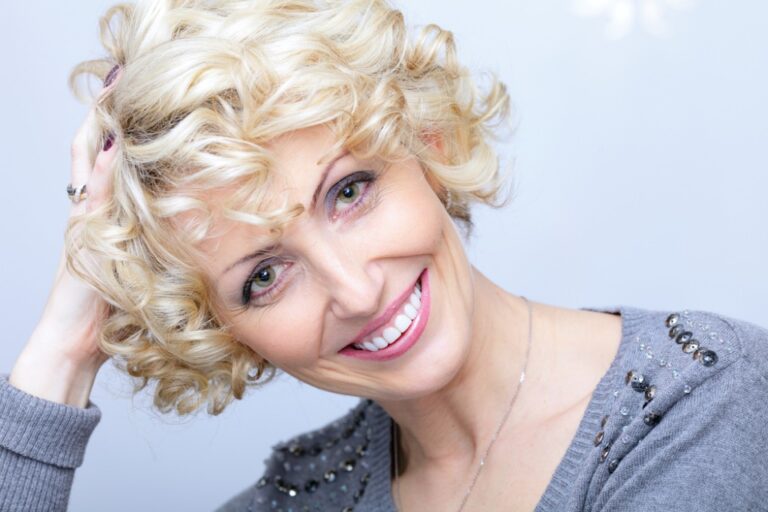
What if I told you it was possible to have your healthiest hair in your 40’s? We don’t have to miss our hair from the “younger days”. Sure, as we age, our hair becomes more delicate and sensitive. For this reason, it becomes increasingly important to pay careful consideration to our hair. This doesn’t have to include an elaborate hair care routine or overly expensive products. I assure you, hair health in your 40’s can actually be simple. If we become more cognizant of the type of products we use and practice a few new healthy-hair habits, the luscious locks will follow.
Here are a few basic do’s and don’ts for haircare as we gracefully enter our middle age.
It’s time to ditch uncovered plastic elastics. Plastic elastics are bound to break and split your hair strands. To minimize damage, use fabric-wrapped hair ties. Additionally, consider the type of hairbrush you use. Generally, a soft-bristle brush, made from natural materials, stimulates hair strength and growth. For example, a boar-bristle brush triggers natural oil production in the scalp and reduces frizz. This brush distributes oil to each strand, which gives your hair a shinier appearance.
By all means, blowout your hair for a date night or an important business meeting, but let your hair air dry as often as possible. The words air dry may spark concerns of frizz and fly-aways. To reduce frizz and breakage during this process, try wrapping and blotting your hair with a microfiber fabric. A microfiber fabric will cause less friction than cotton fabric and is gentler on your hair cuticle. Embrace your natural texture, it’s beautiful!
Let’s be honest, we care for our split ends more than our scalps when it comes to hair care. It is essential to integrate scalp-care into your hair routine to prevent hair loss and promote growth. To properly care for your scalp, you should understand the amount of sebum (oil) your scalp produces daily.
A scalp serum, like the one from Better Not Younger, will provide your hair with the nutrients it needs to look and feel healthy. Not only is this serum light and easily absorbed, but it also contains scalp-stimulating ingredients like caffeine and ginger. A scalp serum is best used at night to ensure the nutrients are fully absorbed into your hair and scalp.
Believe it or not, one of the most important aspects of hair health is what we eat. A lack of key vitamins and nutrients in your diet can stunt hair growth and decrease overall hair health. Your nutritional needs will vary based on your age and any health conditions; however, there are a few rules of thumb. Keratin is the protein that strengthens the hair and prevents breakage.
It is essential to implement the appropriate amount of protein into your diet. Protein-rich foods include leafy greens, berries, Omega-3’s (salmon or chia seeds), and avocados. Additionally, B-vitamins help with the renewal of cells necessary for hair growth. Lastly, iron helps prevent hair loss. Consider using a supplement if these vitamins don’t appear enough in your daily meals.
Typically, we associate heat damage with hot tools; however, we can’t discount sun damage. Just as we protect our skin from the sun, we must protect our hair from the sun! UVA and UVB rays can damage the outside strand of the hair (cuticle). Sun damage can cause discoloration, dry strands, thinning and frizziness.
I know you’ve heard it 1,000 times, but don’t over wash your hair. When you over wash your hair, your oil glands over-compensate for the loss of oils stripped by your shampoo. Instead, you have to train the oil glands to not over-produce oil, thus washing your hair less. It seems scary, but you may have to undergo a period of retraining your hair. Somedays, this could involve wearing hats or pony-tails to hide the grease. You will have to work up to this, but the ultimate goal is to wash your hair every three to four days. The reward will be hydrated hair and balanced oil production.
Our scalp absorbs much of whatever we cleanse it with. Many hair products contain toxic ingredients like parabens, sulfates, phosphates AND alcohols. For example, shampoos can contain sulfates, which break down the proteins in your hair and can hinder hair growth. Additionally, most hairsprays have a high alcohol content, which increases hair dryness. Other products can contain chemicals, like parabens, just to lengthen shelf life. It is best to use natural and light products with non-toxic ingredients. You may have to carefully read the product label, but it will be worth it.
In the ever-evolving world of skincare, the demand for effective and natural solutions has skyrocketed,… Read More
Summer is here and is the beach and all the casual outings. The best thing… Read More
Skincare is a very vast industry with new products getting launched almost every month. Everyone… Read More
Hello! Spring season. The Spring season is one of my favourite seasons. The reason is… Read More
Long, thick, fluttery lashes aren’t just reserved for the stars. They are reserved for our… Read More
Valentine's Day around the corner and ladies are excited about the outfit to impress their… Read More
This website uses cookies.